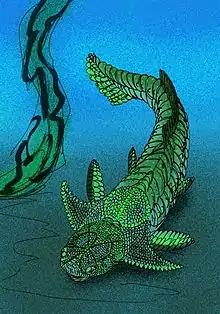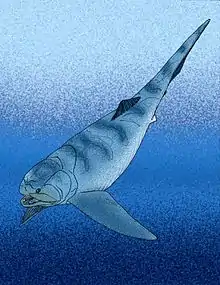Microsteus
Microsteus is a genus of small selenosteid arthrodire placoderms known from the Upper Frasnian Kellwasserkalk facies of Late Devonian Germany.[1]:96
| Microsteus | |
|---|---|
 | |
| Reconstruction of M. dubius | |
| Scientific classification | |
| Kingdom: | |
| Phylum: | |
| Subphylum: | |
| Class: | |
| Order: | |
| Suborder: | |
| Infraorder: | |
| Superfamily: | |
| Family: | |
| Genus: | Microsteus |
| Type species | |
| Microsteus dubius Gross 1932 | |
| Species | |
| |
| Synonyms | |
| |
There are three species, M. dubius (the type species), M. angusticeps, and M. gracilis. M. angusticeps differs from the type species in having a head with an angular profile, and M. gracilis differs from the other two species by being somewhat narrower in cross-section. Denison (1978) suggests that M. angusticeps and M. gracilis do not have enough differences from M. dubius to merit separate species status, but other authors, such as Rücklin 2011, treat the three as separate species.[2]
M. angusticeps and M. gracilis originally composed the genus Parawalterosteus. However, Denison (1978) points out that the two species are not distinct from Microsteus, and synonymized Parawalterosteus with the former genus.
References
- Denison, Robert (1978). Handbook of Paleoichthyology, Volume 2, Placodermi. New York: Gustav Fischer Verlage. p. 98. ISBN 9780895740274.
- RÜCKLIN, MARTIN (January 14, 2011). "First selenosteid placoderms from the eastern Anti-Atlas of Morocco; osteology, phylogeny and palaeogeographical implications". Palaeontology. 56 (1): 25–62. doi:10.1111/j.1475-4983.2010.01026.x.


